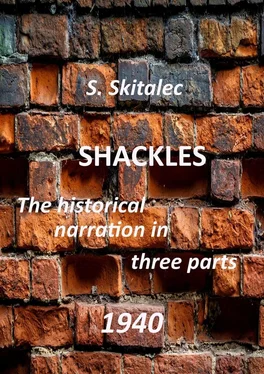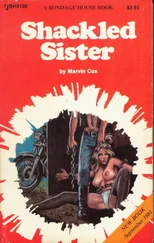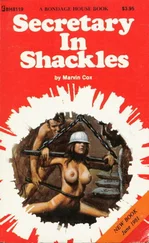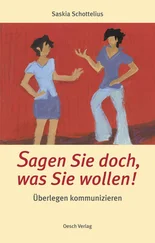S. Skitalec - Shackles
Здесь есть возможность читать онлайн «S. Skitalec - Shackles» — ознакомительный отрывок электронной книги совершенно бесплатно, а после прочтения отрывка купить полную версию. В некоторых случаях можно слушать аудио, скачать через торрент в формате fb2 и присутствует краткое содержание. ISBN: , Жанр: Мифы. Легенды. Эпос, на английском языке. Описание произведения, (предисловие) а так же отзывы посетителей доступны на портале библиотеки ЛибКат.
- Название:Shackles
- Автор:
- Жанр:
- Год:неизвестен
- ISBN:9785449694102
- Рейтинг книги:4 / 5. Голосов: 1
-
Избранное:Добавить в избранное
- Отзывы:
-
Ваша оценка:
- 80
- 1
- 2
- 3
- 4
- 5
Shackles: краткое содержание, описание и аннотация
Предлагаем к чтению аннотацию, описание, краткое содержание или предисловие (зависит от того, что написал сам автор книги «Shackles»). Если вы не нашли необходимую информацию о книге — напишите в комментариях, мы постараемся отыскать её.
Shackles — читать онлайн ознакомительный отрывок
Ниже представлен текст книги, разбитый по страницам. Система сохранения места последней прочитанной страницы, позволяет с удобством читать онлайн бесплатно книгу «Shackles», без необходимости каждый раз заново искать на чём Вы остановились. Поставьте закладку, и сможете в любой момент перейти на страницу, на которой закончили чтение.
Интервал:
Закладка:
Yafim again silently grinned, and Nastya told:
– Prick люта́ I – not life to me will be with it!
– Well, maiden thoughts are changeable! You, tea, prosvatay on that the meat eater!
– I bothered you, perhaps? – Nastya shot up.
– Did not bother and to what to be, to that not to pass, you we will pardon not all! The maid it is less – the woman more! Women repent, and maids are going to get married!. So – s, happened, people of a bayala are old!
The grandfather entered, cheerfully dumped шубняк, rose to become gray log huts under a matitsa and, притопнув bast shoes, unexpectedly started singing:
You, a hmelyushka, are cheerful the head,
The head, wide beard is cheerful!.
As you are absent, hop, more strong,
As you are absent, hop, becoming bright!.
The grandmother burst out laughing with a do-good, konfuzlivy snicker:
– And that you, the old man, rasplyasatsya! hop rustles, so the head is silent!
– Be silent you, the old woman! what is in the furnace, on a table throw everything! – and, притопнув, continued:
Hmelyushka walks across the field,
Still hop vykhvalyat itself!
– Me the sovereign, hop, knows,
Both princes, and boyars esteem,
And monks bless me!
– See you sorted houses! It is visible, there is no place like home?
…Still weddings without hop do not play,
Also fight and reconciled – all in hop!
Only there is on me a male gardener:
Deeply me, a hmelina, buries,
Drives in a tychinushka into zealously heart!
The grandfather straightened a beard and, sitting down to a table, laughed:
– On guests to walk and to itself not to lock a collar!. Let’s take a walk, it is visible, at a wedding, the old woman!.
– Well, well, all right! cheered up!.
– And, well, to cry about what?. it put, Yafima is married! Yafimka, and?
– And you have supper yes lay down – to, the father! – smiling, the son answered.
– To an expense will be as! You do not stint, the old man!.
Ded Pocriakhtel.
– Fifty will leave!. Well and at the good fellow not without sweetheart! The guy in a caftan, and the maid in a sundress!
Lavrusha looked, having lowered the head with polaty, and giggled joyfully: never before he saw the father such cheerful.
– You that, swindler! you laugh? Get down, sit down to a table! Soon and you we will marry!. Single, perhaps, you still?
– Single! – the Laurels giggled, getting down on a bar.
After a dinner the old man was filled up to sleep on полатях, singing more and more quietly, slowing down words:
That are rich men bought
And in a suslitsa the hmelyushka was heated,
On oak barrels spilled!
As here I, hop, cleared up,
On notches I, hop, dispersed:
To Otsmey I to the gardener a nadsmeshka —
I will hit it in тын with the head,
And in the dirt a beard!
After several “hen nights” in the house of the bride the wedding train took place, at last: the church was on Petty-bourgeois Farms.
To Matvei’s yard the whole train drove it is done a bit of traveling, there arrived the cart with a dowry of the young wife.
Near the athlete Yafim it seemed small. Her face was still covered by a veil. A crowd entered a log hut. There it was already covered long, in all log hut, hundred, made of three tables, with the benches which are moved up to it.
Young people were put in a forward corner, to a bozhnitsa. The others stood, they did not need to sit down yet.
Yafim was in a scarlet worsted shirt and a blue cloth caftan, young – in a white dress of city breed. At solemn silence of the numerous guests who filled a log hut, the grandmother approached the daughter-in-law, quietly took off her veil from the head, and all saw the person young: round, white, with bystry clever eyes, with a dense fair-haired braid. The mother-in-law untwined a braid on two, twirled around the head, and on the plot head silk “volosnik” of pink color. Only after that guests began to take seats at a table.
The wedding, “knyazhetsky” feast began.
The new person – the young bourgeois who was not wearing sundresses similar on city entered the conservative country house of the grandfather Matvei. The laurels in a new shirt grandly sat near the brother.
The log hut rustled from a cheerful dialect.
* * *
The spring sun began to warm the fields which did not dry out from the thawed snow yet, and the rural street turned green from the first gentle muravka.
The grandfather Matvei’s family amicably prepared for an arable land: adjusted an ancient heavy plow, repaired harrows, ordered the lacking or broken parts to the smith Migun.
Migun was the fussy big-nosed man with often blinking eyes and hasty, fluent speech. He not only did soshnik, ploughshares and axes, but was able to exorcise blood, treated and tore teeth, gave to drink to patients with a nagovorny grass and was considered as the sorcerer. Lived independently from the village, and its smithy stood on pasture, behind a village fence.
All spring in it work was humming, the horn breathed, sparks poured.
When agricultural tools were given to serviceability, the grandfather Matvei with sons left on an arable land. Next-to-skin, few earth behind a village fence was, and it was plowed so out that never gave a good harvest: to fertilize it to nobody and came to mind because of annual repartitions. Coped with it quickly, and still there was time for the distant field: it was the enormous site in the steppe, versts for thirty from the village – the state earth.
In the olden days it was removed for forty years by men – three families of Listratov – and grew rich from it. Removed on ruble six hryvnias for tithe, and now handed over to men of the village on thirty rubles, but also it was favorable to men. About Listratov said that for them the site – a gold mine.
Except an arable land, men removed at them in the same place and a mowing. Coped with an arable land, and on cleaning each man employed in the city of reapers and mowers. Worked together with hirelings.
Agriculture across Middle Volga was so conducted once.
Ded Matvei from avarice seldom employed alien workers, worked with a family even at night. With a bast basket through a shoulder, without cap, whispering something, scattered seeds a semicircle. Yafim plowed the plow harnessed by four horses, and little Lavrusha was already able to go behind a harrow. Over an arable land rooks curled, damp rich soil hard stuck to bast shoes – hard, tiresome work: the antediluvian plow should be held on hands and on the run to clean off from ploughshares an iron rake the stuck crude earth, legs podvikhivatsya between layers of the vzryty earth, and the breast and a throat overstrained from incessant shout on horses.
From the near field by the evening came back home, but when went to the distant site, lived in the field, in tents, all week and only on Saturday on Sunday came home – to dirt, in dust, black as Blacks; therefore every Saturday “blackly” the baths standing on backs of the village surely burned. On Sunday all village delightfully and long fell down.
The village was above high break under which, maybe, in old centuries Volga proceeded, but then departed on several versts so under break the lugovina was formed, and behind it in a poluversta the rechonka Postepok, small as a stream, densely grown about coast with a sedge and floating water flowers ran.
Through Postepok moved on small, eternally dirty bridge or the corduroy road arranged from the outlined boughs and manure – and immediately the dense oak wood rustling with the solemn and mysterious noise began.
In the spring Volga flooded all wood, approaching closely the village, and then it was possible to float by the boat in the wood standing half in water.
Читать дальшеИнтервал:
Закладка:
Похожие книги на «Shackles»
Представляем Вашему вниманию похожие книги на «Shackles» списком для выбора. Мы отобрали схожую по названию и смыслу литературу в надежде предоставить читателям больше вариантов отыскать новые, интересные, ещё непрочитанные произведения.
Обсуждение, отзывы о книге «Shackles» и просто собственные мнения читателей. Оставьте ваши комментарии, напишите, что Вы думаете о произведении, его смысле или главных героях. Укажите что конкретно понравилось, а что нет, и почему Вы так считаете.









